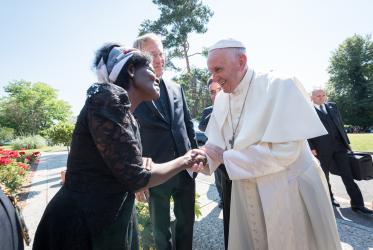At a time of increased divisions within churches and within rapidly changing societies, Christians are called, more urgently than ever before, to model the values of reconciliation, justice and peace.
That’s why a group of theologians and church leaders from different denominations have been meeting near the German city of Augsburg to work together on two documents calling for much closer collaboration in the tasks of peace-building and the care of migrants and refugees.
The group of 18 Catholic, Orthodox, Anglican, Methodist, Lutheran, Presbyterian and Moravian Christians are members of the Joint Working Group (JWG) between the Roman Catholic Church and the World Council of Churches (WCC). The group was set up over half a century ago to foster closer contacts between Rome and Geneva through both theological discussions and practical cooperation.
Despite the much closer relationships that have developed over the past 53 years, the group continues to play a vital role today, according to its co-moderators, Orthodox Metropolitan Nifon of Targoviste in Romania and Catholic Archbishop Diarmuid Martin from Dublin, Ireland.
Archbishop Martin notes that “as society changes, the response of the church has to change”, rediscovering how to hand on “the culture of faith” to the next generation.
He speaks of the deeply Catholic cultures that once characterized his native country, or the Bavarian region of Germany where the JWG was meeting, but acknowledges the self-examination that has been required in the wake of the abuse scandals. He explains how he has been able to develop “real ecumenical friendships” with his Anglican Church of Ireland counterparts, adding that “in difficult times they were of great support to me.”
“We share many of same problems,” he adds, “so we have to find new forms of ecumenical collaboration, not just on the theological questions, but on the way in which, together, we witness to Jesus Christ in a complex world”.
Metropolitan Nifon, who serves on the WCC Central and Executive Committees, agrees that the JWG continues to play an essential role in providing concrete recommendations to the Vatican and to the WCC.
Commenting on the two documents on peace-building and migration, he says: “We believe that it is our duty to debate on these two issues, first of all theologically and spiritually because this is our platform. We are not a United Nations organization to pretend to be analysts, politically, economically, socially and so on.
“The churches should get involved in world affairs”, he insists, “but on the basis of our Christian convictions and dynamics”.
The Orthodox leader believes that education for peace is a key responsibility of the churches, as well as participating in public debates that can influence political leaders to “commit to the cause of peace with justice”.
Metropolitan Nifon notes that the question of migration is a central one for many Orthodox churches today, with four million Romanians living in Europe or North America and a total of 25 to 30 million Orthodox emigrating to traditionally Catholic or Protestant countries.
In Romania, he says, there is a strong tradition of ecumenical cooperation. The different denominations, as well as the leaders of the country’s Islamic and Jewish communities, hold a rotating presidency of the national association of religions.
Like all the members of the JWG, who gathered from 3-7 September for their plenary session, Archbishop Diarmuid Martin believes that Pope Francis’ June visit to the WCC gave new momentum to their mission “to reflect a unity which begins in the Trinity and exists in the very nature of the church”.
He urges Christians to take more seriously their continuing divisions which “damage that witness”, as well as internal divisions within churches that can be “extraordinarily negative and harsh, even going beyond what is acceptable in Christian communities.
“If we don’t try and develop a coming together, in which the Christian faith appears as merciful, forgiving and challenging,” he concludes, “then people are not going to really listen to us”.
More information on the Joint Working Group between the Roman Catholic Church and the WCC
Read also:
Joint WCC-Catholic working group concludes plenary meeting (WCC news release of 7 September 2018)
Catholics, WCC map future together after papal visit to Geneva (WCC news release of 5 September 2018)








